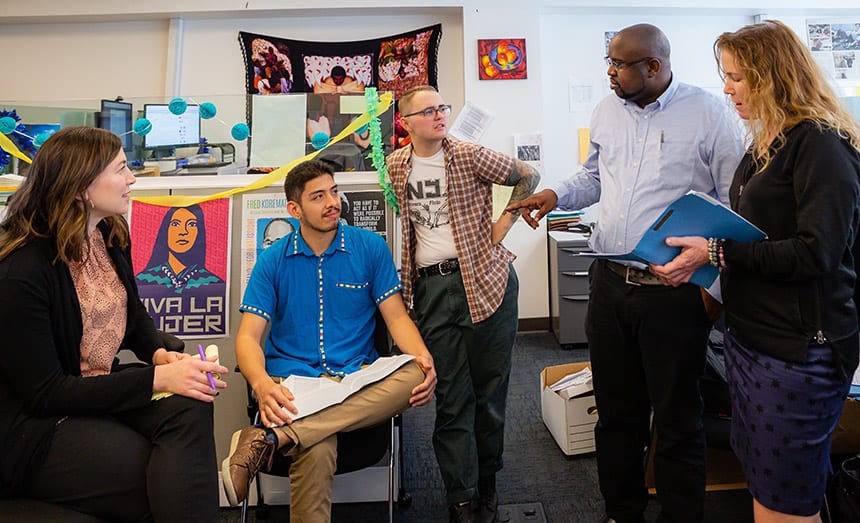
By Gwyneth K. Shaw
For more than 30 years, the East Bay Community Law Center has been a lifeline for Alameda County residents who need critical legal services. As the COVID-19 crisis grips the region, the center’s staffers are finding new angles for advocacy—and seizing the chance to shape the post-coronavirus landscape.
The stay-at-home order across the Bay Area forced the organization to close its office, but EBCLC is still taking new clients and bringing new proposals to state and local governments. Over the last several weeks, the center has pushed for eviction moratoriums and better health and safety measures for the unhoused locally; ramped up its education advocacy efforts to include students impacted by widespread school closures; helped small businesses access federal aid; angled to protect the public benefits coming from the federal government; and continued its work with undocumented immigrants.
It’s all part of EBCLC’s core mission. Founded by Berkeley Law students in 1988, the center is now the now the East Bay’s largest legal services provider as well as the school’s biggest clinical offering. More than 100 students each year help the center provide needed legal services in eight areas, including economic justice, immigration, and housing.
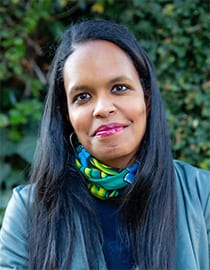
“We are about how to disrupt those systems, to make them more equitable,” says Executive Director Zoë Polk, who took the helm at EBCLC in January. “COVID-19, in its breathtaking devastation, has stopped business as usual. So we have an opportunity, an opening, to really push for all the ways these systems have been failing our clients—particularly people of color—to change.”
In early March, the center sent a letter to local governments with a list of urgent requests, including stopping evictions, car towing, and ticketing people for failing to appear in court. The letter also asked the Alameda County Sheriff’s Office to stop wage garnishments and for local “sanctuary cities” to reaffirm their commitment to protecting the undocumented.
Closing the physical office when people still needed services “was a big deal to us,” Polk says. But the staff has stayed connected, with one another and with clients, and is still taking new clients even as local governments, courts, and schools have been shuttered.
Now, clinic staff are working to ameliorate the impact of the crisis on its clients, and push local and state officials to rethink ideas that, until a few weeks ago, were politically untenable.
“We are saying, ‘Let’s plan, in this moment, how are things going to be different when we go back into court,’” Polk says. “Prosecuting hundreds of evictions a day was not healthy before. It’s certainly not going to be appropriate once the courts reopen. We do have this opportunity now, because for better or for worse, public officials and people who are not usually affected by these problems are now seeing them in a very concrete way.
“This is the framing that EBLC has been using for decades. I think we’re just in a different era now—our collective health is bound up in us getting it right.”
A resource for immigrants
Jeanette Muñoz, a paralegal in the EBCLC’s Immigration Clinic, says her clients’ needs have remained extremely high. But because of the shelter-in-place order, she now lacks a safe space to meet with them. Especially with a U.S. Supreme Court decision expected any day on the Deferred Action for Childhood Arrivals program, which protects more than 700,000 undocumented immigrants from deportation, the need to process applications and renewals remains urgent.
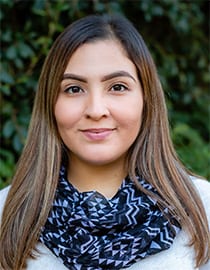
“We’re now just trying to file every single application for every single client that comes through the door—or, now, over the phone,” Muñoz says.
Closing the courts has created a new set of problems, including for young people who could lose eligibility for a juvenile visa if they turn 18 or 21 now. Other clients need to be told not to head to court because their hearing, even a required check-in with the U.S. Immigration and Customs Enforcement, has been canceled.
Staffers are doing consultations, helping with applications, and offering advice as the COVID-19 pandemic raises new questions for undocumented immigrants, including about eligibility for state and federal relief.
“We want to make sure people in the community are aware of what they’re eligible for, and make sure people have those resources available to them,” Muñoz says. “If we can’t reach out to the community as a whole, we can reach out to the organizations that are keeping people informed. That’s our main focus, to make sure people know that we’re still here to help.”
Lifting underserved voices
EBCLC staff are also seeing familiar patterns in the Education Advocacy Clinic, according to Oscar Lopez, a staff attorney and clinical supervisor. The clinic serves black and brown students almost exclusively, and Lopez says those same students are now being disproportionately affected by the lack of technology, instruction, and communication from teachers and principals.
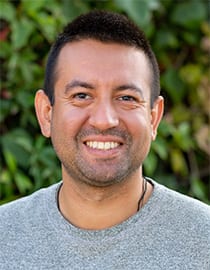
“What this situation has really made clear is that unfortunately there are still a lot of gaps in our education system, and right now they’re on full display,” he says. “We’re trying to work with those families that don’t really have a voice in the governor’s office to try to lift them up and get ahead of some of these issues.”
Sacramento lobbyists are asking Gov. Gavin Newsom to waive guidelines for various timelines and policies related to providing equitable access to education, Lopez says, but families don’t have the same access. EBCLC is trying to be their mouthpiece.
The clinic is asking Newsom for a moratorium on expulsions, which are continuing to move forward even as school districts have stopped offering other services because of the school closures. Once a student has been referred for expulsion, Lopez says, they lose access to any instruction.
“They’re being left behind,” he laments. “There’s nothing that supports expulsion for a pedagogical purpose, especially now.”
Students who are being released from juvenile detention and trying to register for school—typically a condition of their release—are also losing out, Lopez says, since districts aren’t moving on their applications.
“We’ve got students who’ve been waiting to be enrolled for a month, and they’re receiving no education at all, not even distance learning,” he says.
Berkeley Law students working with EBCLC helped dig through local school districts’ distance learning plans to examine their policies for supporting the most vulnerable students. The National Center for Youth Law just published the result of that work as part of a resource page for families.
Lopez’s biggest concern is what school environments will look like once districts are allowed to physically reopen. Given the stress the shuttering of schools has placed on all students, some educators expect to see an uptick in physical aggression once in-person classes resume. That could put poor black and brown students in further peril.
“Educators have discretion about this—they can use a zero-tolerance policy or they can use alternatives, but with budget cuts coming they probably won’t have the resources to do that,” he says. “We’re really hoping school districts will use this moment to use all the other tools they have instead of just pushing kids out.”
A new crisis for the unhoused
Before the coronavirus hit, Berkeley Law student Elly Leggatt ’21 was working with EBCLC’s Clean Slate Clinic on a proposal for the Berkeley City Council aimed at reducing the penalties for tickets for minor offenses, such as having a tent on the sidewalk or drinking in public. The idea is that police should connect offenders with social services—to address the root of the problem—rather than issue tickets that result in jail time.
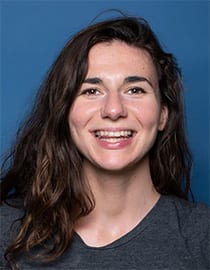
Leggatt is no longer visiting unhoused people on the Berkeley streets, but she’s still working on the issue.
“With new priorities came a shift in the type of work I’m doing,” she says. “But what stayed the same is a willingness to do basically whatever it takes to better the lives of people living on the streets and keep being flexible and adapting methods to do that,” she says.
Leggatt is watching an unintentional experiment based on the proposal happening in real time: Police are ticketing far fewer people now, and crime hasn’t spiked. She’s cautiously optimistic the proposal will have a better shot with new data behind it.
“This is setting a precedent showing that when you stop or lessen the amount that you criminalize being very low-income, the crime rate doesn’t soar,” Leggatt says. “To have a period of time where we can say the city stopped ticketing as much and nothing bad happened, that makes it easier to push the proposal I was working on.
“Hopefully, that ‘radical idea’ won’t seem so frightening.”
New challenges and rewards
Muñoz, who has a 1-year-old daughter, says the crisis has been tough on the EBCLC staff as well. At least one-third have caregiving responsibilities, she says, and the past few weeks have certainly taken a toll on everyone.
“Making sure our staff, my colleagues, are OK mentally and that everything is going well for everyone is a real priority,” she says. “I’m really glad I work for an organization that makes sure everyone is doing well above everything else.”
But the sense of pride—of being able to rise to these challenges, and help the community face them—is palpable, too.
For students like Leggatt, doing this kind of advocacy in a crisis has further enhanced the EBCLC experience.
“The law is only meaningful and the study of law is only meaningful if I can use it to empower people and make some of the changes that I want to see. It can be frustrating to study the law and not be able to do that,” she says. “So it’s amazing to do this. I’ve already acquired the skills and grown in a way that will enable me to be useful and help people navigate these bureaucratic systems.”
And the center still has more to do, Polk says, from pushing for short-term rent cancellation to advocating for a more generous General Assistance Program. The political conversation about universal basic income, which got some traction during the Democratic presidential primary, is also on the list.
“We want to make sure that these institutions we have set up are actually going to benefit the people they were set up for,” she says. “This is a time when people are really going to need those safety nets.”
Need help? Start here to learn how to access assistance.
Home page photo credit: Brittany Hosea-Small